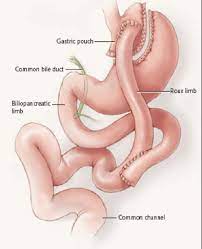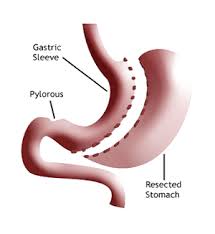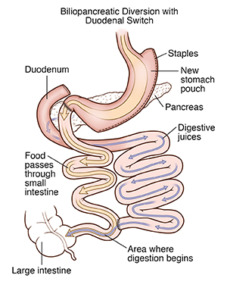Bariatric surgery, or weight loss surgery, is a medical procedure performed to help individuals lose weight and improve their overall health. There are several types of weight loss surgeries, each with its own unique benefits and considerations. It’s important to note that the suitability of a specific procedure depends on an individual’s medical history, body mass index (BMI), and other factors. Here are the common types of bariatric surgery we perform and their associated benefits:
Gastric Bypass Surgery (Roux-en-Y Gastric Bypass):
- In this procedure, the surgeon creates a small pouch at the top of the stomach and then connects it directly to the small intestine, bypassing a portion of the stomach and the upper part of the small intestine.
- Benefits: Gastric bypass surgery reduces the size of the stomach, limits the amount of food you can eat, and changes how your body absorbs nutrients. This surgery often leads to significant weight loss and can improve or resolve conditions such as type 2 diabetes, high blood pressure, and sleep apnea.

Sleeve Gastrectomy:
- During a sleeve gastrectomy, a large portion of the stomach is removed, leaving a smaller, banana-shaped “sleeve” of stomach.
- Benefits: This surgery reduces the size of the stomach, which helps control portion sizes and decreases hunger. It can lead to substantial weight loss and may improve or resolve obesity-related health conditions.

Biliopancreatic Diversion with Duodenal Switch (BPD/DS):
- This surgery combines a sleeve gastrectomy with a partial duodenal switch, redirecting food from the stomach to the lower part of the small intestine.
- Benefits: BPD/DS can lead to significant weight loss and is particularly effective for individuals with high BMIs (50+). It also has a greater potential for improvement in obesity-related conditions. However, it is a more complex surgery and requires lifelong vitamin and supplement intake.

Revisional Surgery:
- Unfortunately, there is no 100% foolproof method to lose weight and keep it off. Whether it be diet and exercise, weight-loss prescription medications or surgical procedures, every option has an inherent failure rate. Although the failure rate is lowest with surgery, 10-30% of people will regain weight after a surgical procedure for weight loss.
The reasons for this are not always clear. - For individuals who gain a modest amount of weight, the solution might be to return to the basics. Sometimes, deviation from the original behaviors learned after surgery can cause weight regain. For others, there is a technical issue with the operation causing weight regain. Again, there are many reasons for weight regain, and these should be discussed with your doctor.
- For patients who have had lab-band procedures that failed, removal or conversion to sleeve or bypass is also an option.
Each type of bariatric surgery has its own benefits and potential risks. It’s important for individuals considering bariatric surgery to work closely with a medical team, including a surgeon, dietitian, and other healthcare professionals, to determine the most appropriate option based on their individual needs and health status. If you’re considering surgery or just want to know more about your options, we’re here to help. At Weight Loss Specialists of North Texas, we believe in a no-blame, no-shame, compassionate approach to patient care. Contact us today to get started.


